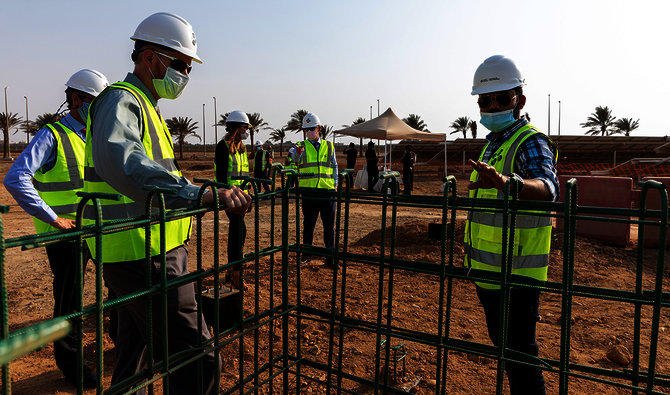TUNIS: Tunisia’s parliament was set to vote on a major amendment to the electoral law on Friday, nine days before a presidential election that opposition groups fear will cement President Kais Saied’s authoritarian rule. The bill strips the Administrative Court of its authority to adjudicate electoral disputes. It is likely to pass in an assembly elected in 2022 on an 11 percent turnout after Saied dissolved the previous one and prompted an opposition boycott.
Political opposition and civil society groups called for protests against the bill near parliament.
The Administrative Court is widely seen as the last independent judicial body, after Saied dissolved the Supreme Judicial Council and dismissed dozens of judges in 2022. The court this month ordered the electoral commission to reinstate disqualified presidential candidates, saying the legitimacy of the Oct. 6 election was in question. But the commission defied the court and has allowed only two candidates to run against Saied.
Lawmakers said they had proposed the bill because they believed the Administrative Court was no longer neutral and could annul the election and plunge Tunisia into chaos and a constitutional vacuum.
Critics argue that Saied is using the electoral commission and the judiciary to secure victory by stifling competition and intimidating rivals. He for his part says he is fighting traitors, mercenaries and corruption.
Saied was democratically elected in 2019, but then tightened his grip on power and began ruling by decree in 2021 in a move the opposition has described as a coup. Presidential candidate Ayachi Zammel was sentenced last week to 20 months in prison on charges of falsifying popular endorsements, and to a further six months on Wednesday on charges of falsifying documents.
Abir Moussi, leader of the Free Constitutional Party, has been imprisoned since last year on charges of harming public security. Another prominent politician, Lotfi Mraihi, was jailed this year on charges of vote-buying in 2019.
Both had said they would run in October, but were prevented from submitting their applications from jail.
Another court jailed four other potential candidates in August and gave them lifetime bans from running for office.
Tunisia assembly votes on electoral bill nine days before poll, opposition calls protest
https://arab.news/vjzzp
Tunisia assembly votes on electoral bill nine days before poll, opposition calls protest

- Bill strips Administrative Court of authority over electoral disputes
- Critics argue Saied uses judiciary to stifle competition and intimidate rivals
Large drop in number of aid trucks entering Gaza on Friday

- The influx of aid this week compares with just 2,892 aid trucks entering Gaza for the whole of December, according to data from the UN Palestinian relief agency UNRWA
UNITED NATIONS: More than 4,200 aid trucks have entered the Gaza Strip in the six days since a ceasefire began between Israel and Palestinian militants Hamas, the United Nations said, although there was a large drop in the number of loads delivered on Friday.
The UN Office for the Coordination of Humanitarian Affairs (OCHA) said 339 aid trucks crossed into Gaza on Friday, citing information from Israeli authorities and the guarantors for the ceasefire agreement — the United States, Egypt and Qatar.
This compares with 630 on Sunday, 915 on Monday, 897 on Tuesday, 808 on Wednesday, and 653 on Thursday.
The truce deal requires at least 600 truckloads of aid to enter Gaza each day of the initial six-week ceasefire, including 50 carrying fuel. Half of those trucks are supposed to go to Gaza’s north, where experts have warned famine is imminent.
When asked why there was a large drop in the number of aid trucks on Friday, OCHA spokesperson Eri Kaneko said the UN and humanitarian partners “have been working as quickly as possible to dispatch and distribute this large volume of assistance” to some 2.1 million people across the devastated enclave.
The influx of aid this week compares with just 2,892 aid trucks entering Gaza for the whole of December, according to data from the UN Palestinian relief agency UNRWA.
Aid is dropped off on the Gaza side of the border, where it is picked up by the UN and distributed. Data from OCHA shows 2,230 aid truckloads — an average of 72 a day — were then picked up in December.
Throughout the 15-month war, the UN has described its humanitarian operation as opportunistic — facing problems with Israel’s military operation, access restrictions by Israel, and more recently looting by armed gangs.
The UN has said that there has been no apparent major law-and-order issues since the ceasefire came into effect.
“We are also scaling up the broader response, including by providing protection assistance, education activities and other essential support,” Kaneko said.
Pope Francis warns of ‘fanaticism, hatred’ in social media

- The pope’s admonition comes as X, owned by Elon Musk, has been accused of spreading false information while interfering in European politics, in particular for attacking leaders including German Chancellor Olaf Scholz and British Prime Minister Keir Starm
VATICAN CITY: Pope Francis denounced an era of “disinformation and polarization” on Friday in a message for World Communications Day, as he criticized powerful social networks creating “fanaticism and even hatred.”
In saluting journalists, he spoke of their collective responsibility working “in these our times, characterised by disinformation and polarization, as a few centers of power control an unprecedented mass of data and information.”
The 88-year-old pope — who has warned in the past of the dangers of new technologies, including social media and artificial intelligence — did not cite Facebook or X by name, but his target was evident.
“Too often today, communication generates not hope, but fear and despair, prejudice and resentment, fanaticism and even hatred,” the pope wrote in his message.
“All too often it simplifies reality in order to provoke instinctive reactions; it uses words like a razor; it even uses false or artfully distorted information to send messages designed to agitate, provoke or hurt.”
FASTFACTS
• The 88-year-old pope — who has warned in the past of the dangers of new technologies, including social media and artificial intelligence — did not cite Facebook or X by name, but his target was evident.
• In a speech quoting Martin Luther King Jr., Francis said he dreamed of ‘communication that does not peddle illusions or fears, but is able to give reasons for hope.
The pope’s admonition comes as X, owned by Elon Musk, has been accused of spreading false information while interfering in European politics, in particular for attacking leaders including German Chancellor Olaf Scholz and British Prime Minister Keir Starmer.
The billionaire also used his platform and vast wealth to help propel Donald Trump to the White House.
Meta has also come under fire after its chief Mark Zuckerberg said this month that Facebook would end its third-party fact-checking program in the United States, in what critics warned would further fuel false information online.
In a speech quoting Martin Luther King Jr., Francis said he dreamed of “communication that does not peddle illusions or fears, but is able to give reasons for hope.”
He warned, however, of algorithms that feed social media users information that is specifically catered to their interests and prejudices.
Such “digital systems... by profiling us according to the logic of the market, modify our perception of reality,” he said.
“As a result, we witness, often helplessly, a sort of atomization of interests that ends up undermining the foundations of our existence as a community, our ability to join in the pursuit of the common good, to listen to one another and to understand each other’s point of view.”
Earlier this month, in his New Year’s address to Vatican diplomats, Francis lamented increasing polarization in society, “aggravated by the continuous creation and spread of fake news.”
Francis himself is a frequent target of unfounded rumors and manipulated photos online.
How Saudi Arabia is making the construction industry greener and more sustainable

- The Kingdom is advancing green construction techniques with cutting-edge technologies, local partnerships, and regulatory support
- Red Sea Global, SCG International, VEKR Environmental Services, and SABIC are setting the standard for sustainable construction
RIYADH: Saudi Arabia is embracing sustainability as a core element of its Vision 2030 economic reform agenda, driving transformative practices across whole industries.
Nowhere is this more evident than in the Kingdom’s construction sector, where innovative solutions and eco-conscious strategies are reshaping the urban landscape.
Through cutting-edge technologies, collaborative efforts and the adoption of environmentally responsible materials, companies like Red Sea Global, SCG International, VEKR Environmental Services and SABIC are setting a high standard for sustainable development.

Red Sea Global has made environmental stewardship a priority across its mega-projects, ensuring that development enhances rather than disrupts the delicate ecosystem.
“At Red Sea Global, we have initiated several critical programs to safeguard endangered species such as the hawksbill turtles and sooty falcons,” Raed Al-Basseet, RSG’s group chief environment and sustainability officer, told Arab News.
“These efforts include habitat conservation, the protection of turtles’ nesting sites, and tagging programs to monitor their behaviors. On birds, we’ve established artificial nesting sites for the sooty falcon and implemented preventive measures to mitigate bird collisions.”

The organization has also embraced advanced technologies to protect marine ecosystems.
“RSG is leveraging state-of-the-art technologies, including drone surveys equipped with multispectral cameras and satellite imagery for coral reef mapping,” Al-Basseet said.
These tools ensure the real-time monitoring of coral reefs, mangroves and seagrasses, while helping respond swiftly to environmental changes.
DID YOUKNOW?
• Saudi Arabia’s construction sector produces about 38% of the Kingdom’s carbon emissions, highlighting the critical need for sustainable practices.
• Mangroves, like those planted by RSG, can sequester up to 10 times more carbon per hectare than tropical rainforests.
• LEED Gold-certified buildings, like SABIC’s Jubail headquarters, consume 30% less energy than traditional buildings.
• 3D-printed construction reduces material waste by up to 60%, significantly lowering environmental impact.
RSG’s achievements extend beyond conservation. The company’s renewable energy initiatives have resulted in the installation of more than 760,500 solar panels, reducing CO2 emissions by 46,350 tonnes annually.
Additionally, its mangrove nursery produced more than 1 million seedlings in 2024, with a target of reaching 3 million this year.
“Our commitment to achieving a net conservation benefit of 30 percent by 2040 is integral to our vision of creating harmonious development,” Al-Basseet added.
Another key player in Saudi Arabia’s sustainability journey is SABIC, a global leader in materials innovation and environmental solutions.

SABIC’s Jubail headquarters, which has been certified with LEED Gold, stands as a symbol of green construction.
The building incorporates solar energy systems, wind turbines and electric vehicle charging stations, while also utilizing water recycling systems and low-energy lighting controls.
Beyond infrastructure, SABIC is pioneering efforts in carbon capture and utilization. The company operates the world’s largest CO2 purification and liquefaction plant, capturing 500,000 tonnes annually to convert into valuable products such as methanol and ammonia.
These initiatives reflect SABIC’s broader goal of achieving carbon neutrality by 2050, with an interim target of reducing greenhouse gas emissions by 20 percent by 2030.
Opinion
This section contains relevant reference points, placed in (Opinion field)
In addition to these efforts, SABIC has launched a circular carbon economy model, promoting renewable energy, chemical recycling and afforestation projects.
The company’s recent exports of low-carbon ammonia to global markets, including Japan and South Korea, highlight its leadership in sustainable industrial practices.
Sustainability in construction is not just about preserving nature but also about adopting technologies that redefine how buildings are constructed. SCG International, a global leader in green building solutions, is paving the way for technological innovation in the Kingdom.
“3D printing technology enables accelerated construction timelines, reducing time by up to 30 to 50 percent and labor requirements by 50 percent,” Abhijit Datta, managing director of SCG International, told Arab News.
“It significantly reduces material waste and ensures no leftover raw materials, contributing to a cleaner and safer working environment, by lowering dust and noise levels.”
Among its innovations, SCG’s concrete fabric offers a sustainable solution for erosion control and water management.
“This flexible material conforms to various shapes, reducing logistics costs and emissions while ensuring durability,” Datta said.

The company’s commitment to local empowerment is equally noteworthy. SCG actively collaborates with Saudi firms to train teams in low-carbon cement and ready-mix consultancy services.
Despite recent progress, the adoption of sustainable construction technologies has faced difficulties.
“One of the primary challenges is the high upfront cost of sustainable building practices, which can be a concern for clients,” Dana Al-Damegh, an environmental consultant at VEKR Environmental Services, told Arab News.
“Many are not fully aware of the long-term benefits, including cost savings and enhanced efficiency, that sustainable materials can offer.”
Another pressing issue is the scarcity of resources.

“There is currently a shortage of locally sourced materials, which poses a challenge to sustainable construction efforts,” Al-Damegh said.
“This scarcity extends to skilled manpower as well, which further impacts the ability to fully leverage local resources. Addressing these gaps is crucial for achieving greater sustainability in the sector.”
Nonetheless, Al-Damegh is optimistic about the future. “The collaboration between environmental services companies and regulatory bodies has been instrumental in driving progress,” she said.
As the Kingdom advances its Vision 2030 reform agenda, the focus on green construction continues to grow. The integration of advanced technologies, development of local supply chains and investments in education as well as training will be critical to scaling sustainable practices.
“The successful implementation of sustainable methods requires collaboration, commitment and the right resources,” said Al-Damegh. “All of which are becoming increasingly accessible in Saudi Arabia’s evolving environmental landscape.”

Man arrested over TikTok posts threatening US President Trump

- 23-year-old Douglas Thrams reportedly posted multiple videos on Tiktok since Monday, threatening anti-government violence, according to a criminal complaint
WASHINGTON: A man who allegedly said US President Donald Trump "needs to be assassinated" and posed on TikTok holding a rifle has been arrested, authorities said.
Douglas Thrams, 23, posted multiple videos on Tiktok between Monday, when Trump was inaugurated, and Wednesday threatening anti-government violence, according to a criminal complaint Thursday.
"Every US government building needs be bombed immediately," Thrams was quoted as saying in one of the videos.
Referring to Trump, Thrams went on to say, using an expletive, "He needs to be assassinated and this time, don't... miss."
Trump was the target of two assassination attempts last year including one at a rally in Butler, Pennsylvania, where he was wounded in the ear.
In another video, Thrams held a rifle and tapped it, an FBI agent said in an affidavit.
Thrams, from the midwestern state of Indiana, was arrested on Thursday and charged with making "interstate communications with a threat to injure."
Gaza aid surge having an impact but challenges remain

- In the final months before the ceasefire, the few aid convoys that managed to reach central and northern Gaza were routinely looted
- Over the past week, UN officials have reported "minor incidents of looting"
JERUSALEM: Hundreds of truckloads of aid have entered Gaza since the Israel-Hamas ceasefire began last weekend, but its distribution inside the devastated territory remains an enormous challenge.
The destruction of the infrastructure that previously processed deliveries and the collapse of the structures that used to maintain law and order make the safe delivery of aid to the territory's 2.4 million people a logistical and security nightmare.
In the final months before the ceasefire, the few aid convoys that managed to reach central and northern Gaza were routinely looted, either by desperate civilians or by criminal gangs.
Over the past week, UN officials have reported "minor incidents of looting" but they say they are hopeful that these will cease once the aid surge has worked its way through.
In Rafah, in the far south of Gaza, an AFP cameraman filmed two aid trucks passing down a dirt road lined with bombed out buildings.
At the first sight of the dust cloud kicked up by the convoy, residents began running after it.
Some jumped onto the truck's rear platforms and cut through the packaging to reach the food parcels inside.
UN humanitarian coordinator for the Middle East Muhannad Hadi said: "It's not organised crime. Some kids jump on some trucks trying to take food baskets.
"Hopefully, within a few days, this will all disappear, once the people of Gaza realise that we will have aid enough for everybody."
central Gaza, residents said the aid surge was beginning to have an effect.
"Prices are affordable now," said Hani Abu al-Qambaz, a shopkeeper in Deir el-Balah. For 10 shekels ($2.80), "I can buy a bag of food for my son and I'm happy."
The Gaza spokesperson of the Fatah movement of Palestinian president Mahmud Abbas said that while the humanitarian situation remained "alarming", some food items had become available again.
The needs are enormous, though, particularly in the north, and it may take longer for the aid surge to have an impact in all parts of the territory.
In the hunger-stricken makeshift shelters set up in former schools, bombed-out houses and cemeteries, hundreds of thousands lack even plastic sheeting to protect themselves from winter rains and biting winds, aid workers say.
In northern Gaza, where Israel kept up a major operation right up to the eve of the ceasefire, tens of thousands had had no access to deliveries of food or drinking water for weeks before the ceasefire.
With Hamas's leadership largely eliminated by Israel during the war, Gaza also lacks any political authority for aid agencies to work with.
In recent days, Hamas fighters have begun to resurface on Gaza's streets. But the authority of the Islamist group which ruled the territory for nearly two decades has been severely dented, and no alternative administration is waiting in the wings.
That problem is likely to get worse over the coming week, as Israeli legislation targeting the lead UN aid agency in Gaza takes effect.
Despite repeated pleas from the international community for a rethink, the UN Relief and Works Agency for Palestine Refugees (UNRWA), which has been coordinating aid deliveries into Gaza for decades, will be effectively barred from operating from Tuesday.
UNRWA spokesman Jonathan Fowler warned the effect would be "catastrophic" as other UN agencies lacked the staff and experience on the ground to replace it.
British Foreign Secretary David Lammy warned last week that the Israeli legislation risked undermining the fledgling ceasefire.
Brussels-based think tank the International Crisis Group said the Israeli legislation amounted to "robbing Gaza's residents of their most capable aid provider, with no clear alternative".
Israel claims that a dozen UNRWA employees were involved in the October 2023 attack by Hamas gunmen, which started the Gaza war.
A series of probes, including one led by France's former foreign minister Catherine Colonna, found some "neutrality related issues" at UNRWA but stressed Israel had not provided evidence for its chief allegations.

















